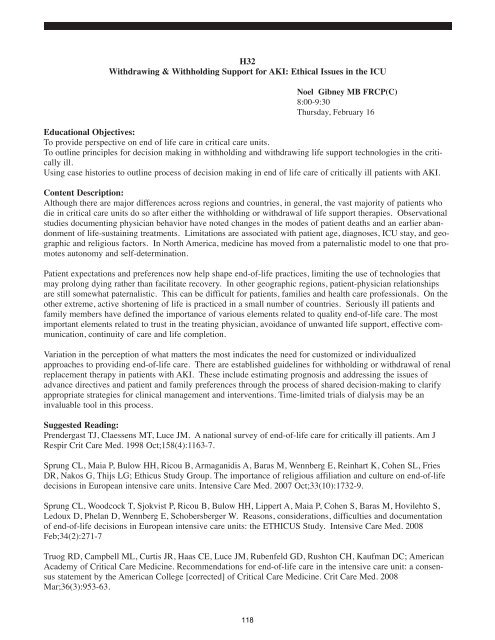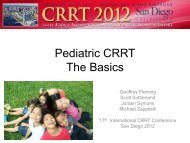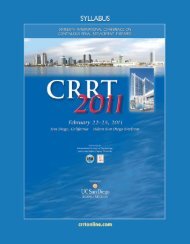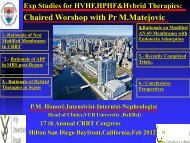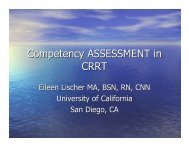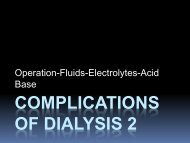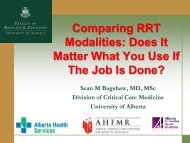ABSTRACTS from 16th International COnference on ... - CRRT Online
ABSTRACTS from 16th International COnference on ... - CRRT Online
ABSTRACTS from 16th International COnference on ... - CRRT Online
You also want an ePaper? Increase the reach of your titles
YUMPU automatically turns print PDFs into web optimized ePapers that Google loves.
H32<br />
Withdrawing & Withholding Support for AKI: Ethical Issues in the ICU<br />
Noel Gibney MB FRCP(C)<br />
8:00-9:30<br />
Thursday, February 16<br />
Educati<strong>on</strong>al Objectives:<br />
To provide perspective <strong>on</strong> end of life care in critical care units.<br />
To outline principles for decisi<strong>on</strong> making in withholding and withdrawing life support technologies in the critically<br />
ill.<br />
Using case histories to outline process of decisi<strong>on</strong> making in end of life care of critically ill patients with AKI.<br />
C<strong>on</strong>tent Descripti<strong>on</strong>:<br />
Although there are major differences across regi<strong>on</strong>s and countries, in general, the vast majority of patients who<br />
die in critical care units do so after either the withholding or withdrawal of life support therapies. Observati<strong>on</strong>al<br />
studies documenting physician behavior have noted changes in the modes of patient deaths and an earlier aband<strong>on</strong>ment<br />
of life-sustaining treatments. Limitati<strong>on</strong>s are associated with patient age, diagnoses, ICU stay, and geographic<br />
and religious factors. In North America, medicine has moved <str<strong>on</strong>g>from</str<strong>on</strong>g> a paternalistic model to <strong>on</strong>e that promotes<br />
aut<strong>on</strong>omy and self-determinati<strong>on</strong>.<br />
Patient expectati<strong>on</strong>s and preferences now help shape end-of-life practices, limiting the use of technologies that<br />
may prol<strong>on</strong>g dying rather than facilitate recovery. In other geographic regi<strong>on</strong>s, patient-physician relati<strong>on</strong>ships<br />
are still somewhat paternalistic. This can be difficult for patients, families and health care professi<strong>on</strong>als. On the<br />
other extreme, active shortening of life is practiced in a small number of countries. Seriously ill patients and<br />
family members have defined the importance of various elements related to quality end-of-life care. The most<br />
important elements related to trust in the treating physician, avoidance of unwanted life support, effective communicati<strong>on</strong>,<br />
c<strong>on</strong>tinuity of care and life completi<strong>on</strong>.<br />
Variati<strong>on</strong> in the percepti<strong>on</strong> of what matters the most indicates the need for customized or individualized<br />
approaches to providing end-of-life care. There are established guidelines for withholding or withdrawal of renal<br />
replacement therapy in patients with AKI. These include estimating prognosis and addressing the issues of<br />
advance directives and patient and family preferences through the process of shared decisi<strong>on</strong>-making to clarify<br />
appropriate strategies for clinical management and interventi<strong>on</strong>s. Time-limited trials of dialysis may be an<br />
invaluable tool in this process.<br />
Suggested Reading:<br />
Prendergast TJ, Claessens MT, Luce JM. A nati<strong>on</strong>al survey of end-of-life care for critically ill patients. Am J<br />
Respir Crit Care Med. 1998 Oct;158(4):1163-7.<br />
Sprung CL, Maia P, Bulow HH, Ricou B, Armaganidis A, Baras M, Wennberg E, Reinhart K, Cohen SL, Fries<br />
DR, Nakos G, Thijs LG; Ethicus Study Group. The importance of religious affiliati<strong>on</strong> and culture <strong>on</strong> end-of-life<br />
decisi<strong>on</strong>s in European intensive care units. Intensive Care Med. 2007 Oct;33(10):1732-9.<br />
Sprung CL, Woodcock T, Sjokvist P, Ricou B, Bulow HH, Lippert A, Maia P, Cohen S, Baras M, Hovilehto S,<br />
Ledoux D, Phelan D, Wennberg E, Schobersberger W. Reas<strong>on</strong>s, c<strong>on</strong>siderati<strong>on</strong>s, difficulties and documentati<strong>on</strong><br />
of end-of-life decisi<strong>on</strong>s in European intensive care units: the ETHICUS Study. Intensive Care Med. 2008<br />
Feb;34(2):271-7<br />
Truog RD, Campbell ML, Curtis JR, Haas CE, Luce JM, Rubenfeld GD, Rusht<strong>on</strong> CH, Kaufman DC; American<br />
Academy of Critical Care Medicine. Recommendati<strong>on</strong>s for end-of-life care in the intensive care unit: a c<strong>on</strong>sensus<br />
statement by the American College [corrected] of Critical Care Medicine. Crit Care Med. 2008<br />
Mar;36(3):953-63.<br />
118


